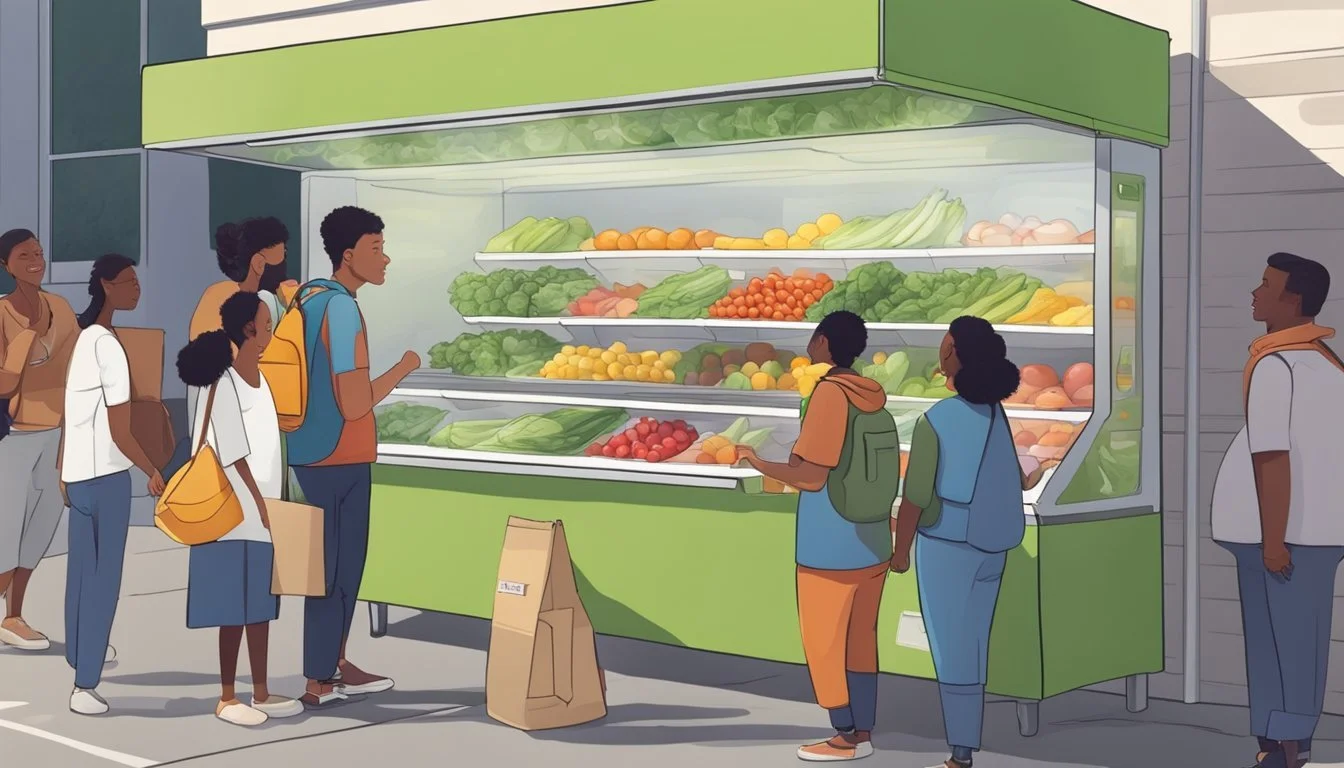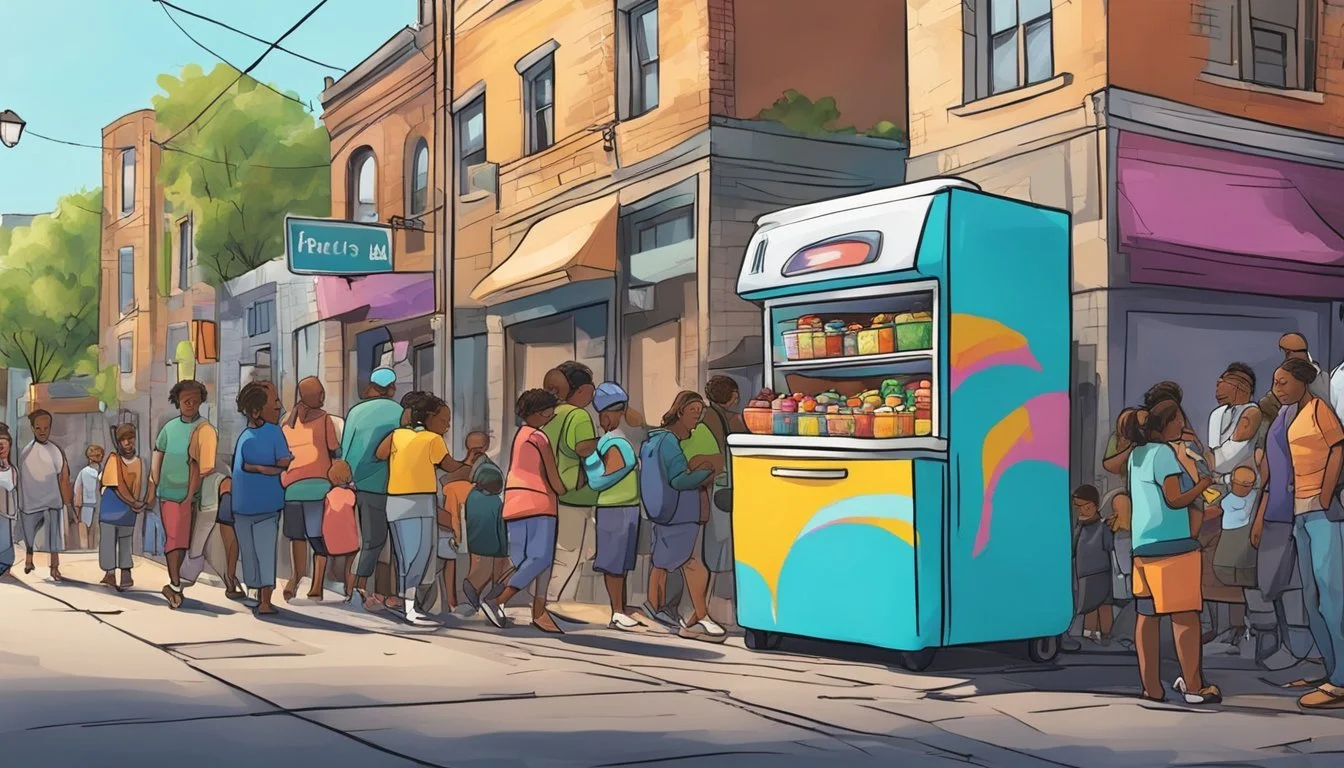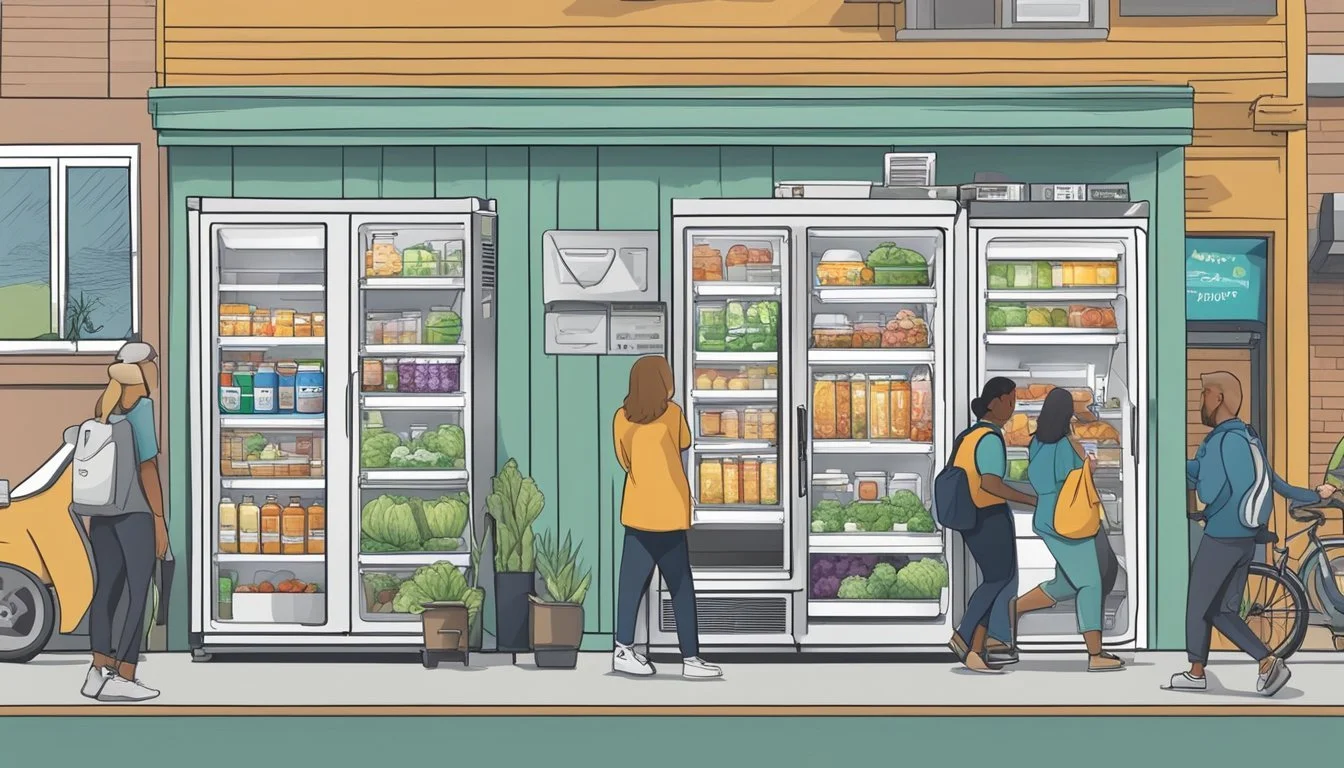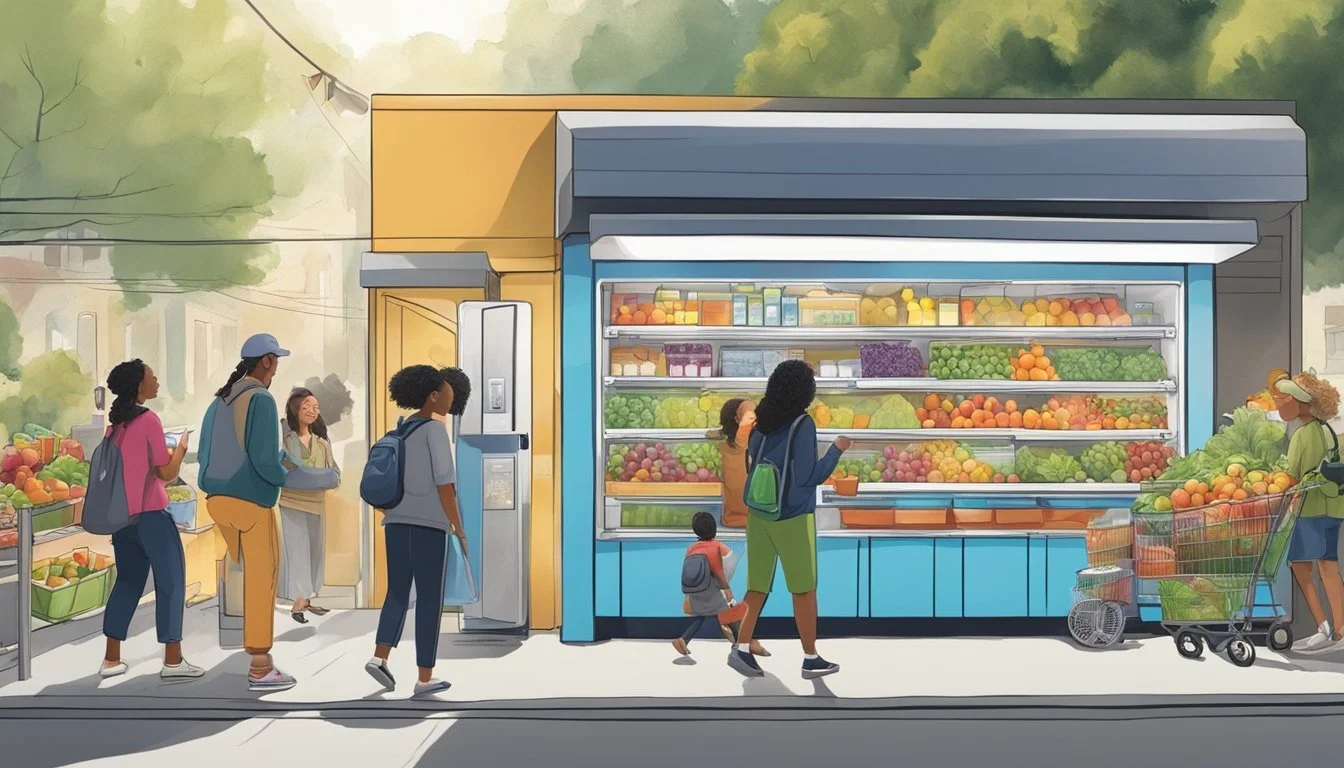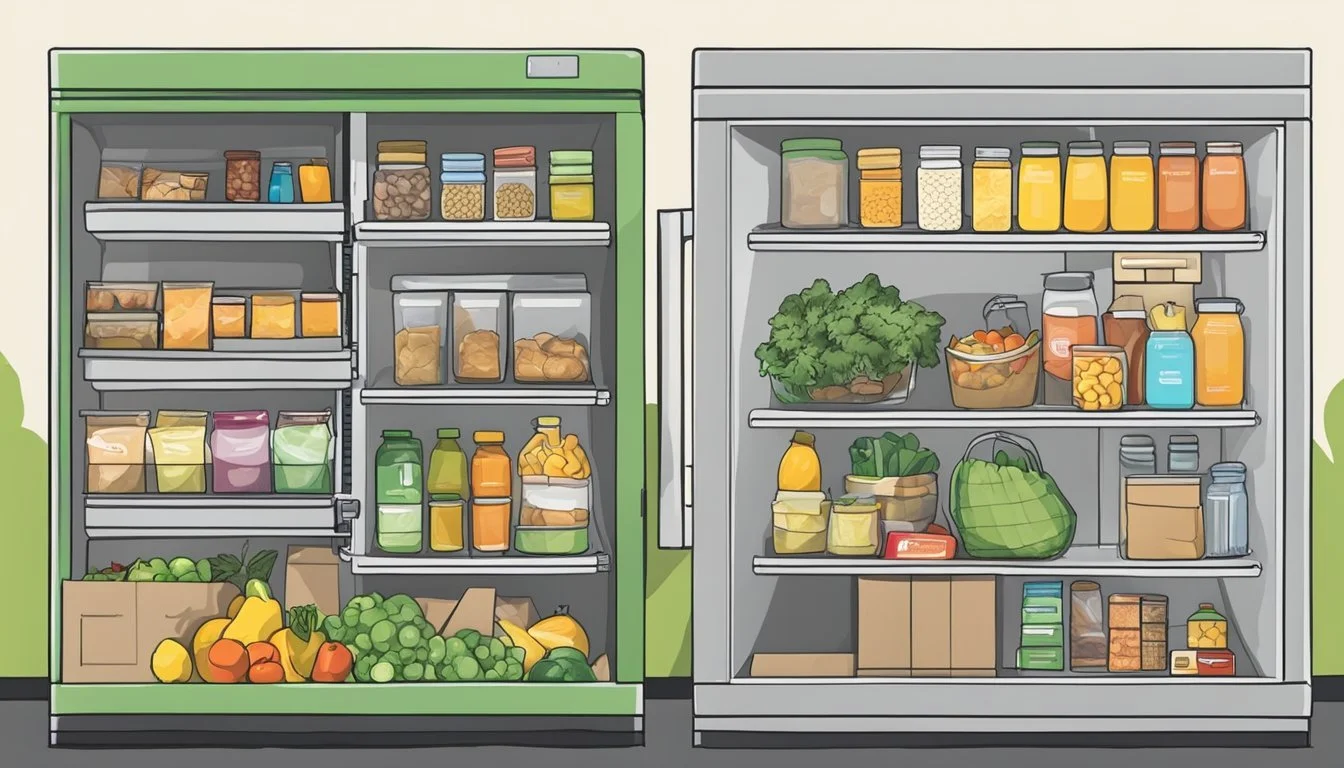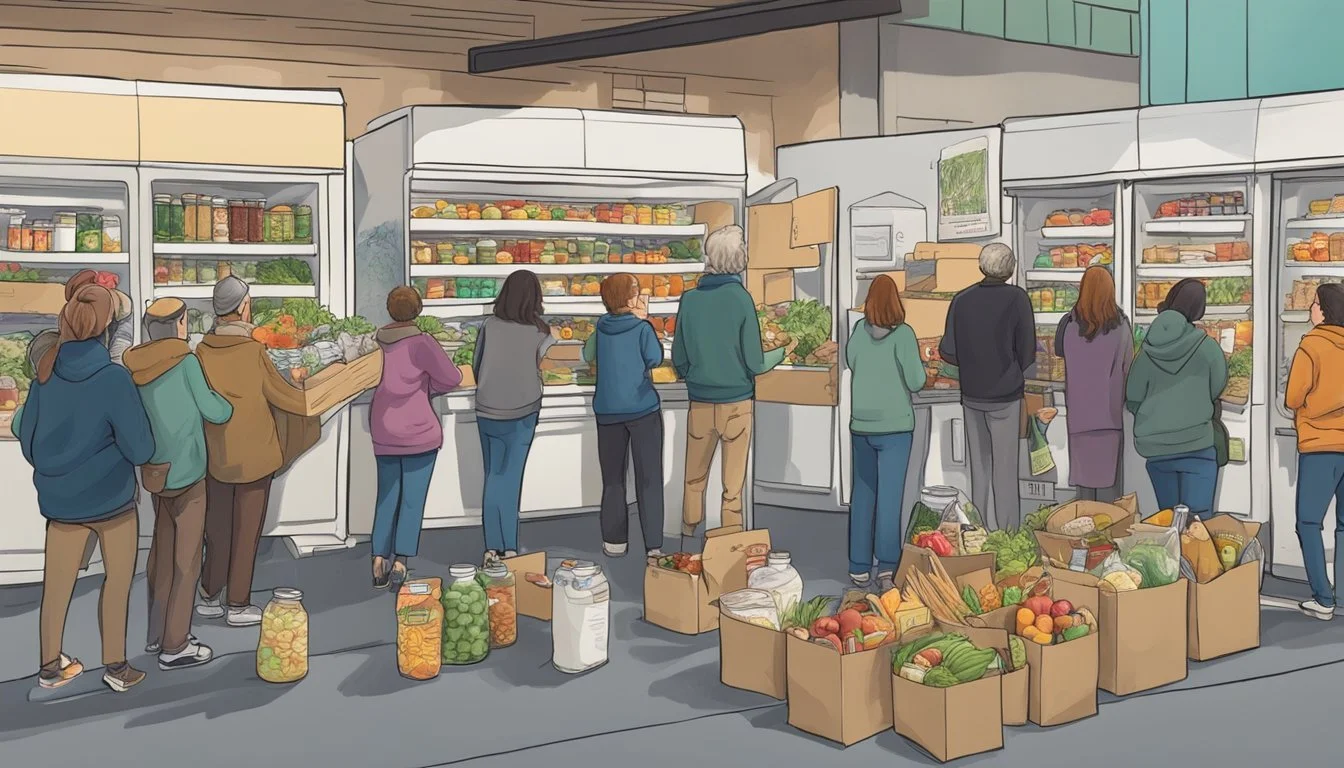Eugene, OR Community Fridge
Nourishing Connections in the Neighborhood
Eugene, Oregon, is addressing food insecurity through an innovative approach: the Eugene Community Fridge. This initiative operates on the philosophy of mutual aid, where the focus is on providing accessible, no-cost food to residents in need. Based on Kalapuya territory, this project aims to alleviate the pressures of food insecurity in the community, offering free perishable goods to anyone without the stipulation of qualification or the exchange of money.
Community fridges serve as a physical testament to the power of communal support and solidarity. It is a simple concept—a refrigerator that the community stocks with food that can then be accessed by anyone, at any time. They are often placed in accessible locations, spearheaded by local organizations or collective groups motivated by the desire to provide for their neighbors. In a city like Eugene, where thousands have faced food insecurity, the emergence of community fridges offers a beacon of hope and a practical solution to a widespread issue.
The concept has evolved over time with the support of organizations such as the Burrito Brigade, which, in addition to establishing more than 50 Little Free Pantries, checks and stocks them regularly. This is complemented by local efforts to establish two Community Fridge locations, aimed at providing not just non-perishables but also fresh food options like meats, dairy, and produce. The fridges further underline Eugene’s commitment to fostering a community-fed, self-sustaining support system that reaches out to residents from all walks of life.
Origin and Mission of Eugene Community Fridges
Eugene Community Fridges is a grassroots initiative focused on combating food insecurity in Lane County, Oregon. It was founded by an individual known as Goose, a Eugene resident who took the first steps to address the urgent need for accessible food resources.
Mission: The mission of Eugene Community Fridges is rooted in the principles of mutual aid, aiming to end food insecurity by establishing a network of community fridges throughout Eugene. These refrigerators are placed in accessible locations and are stocked with free food for anyone in need, operating under the fundamental belief that access to food is a right, not a privilege.
Collaborations and Impact:
The fridges provide a platform for community members to support one another through donations and volunteering.
Collaborations with local nonprofits, such as the Burrito Brigade, amplify the reach and efficacy of the project. Burrito Brigade, known for distributing vegan meals to the hungry and unhoused, contributes by offering additional resources and support to the fridge program.
Community fridges serve as a tangible solution to food deserts, ensuring that fresh and nutritious food is available to all, regardless of socioeconomic status.
By maintaining a clear and open line of communication, the team behind Eugene Community Frididges remains transparent about their progress and needs. They invite community participation through various channels, like their Instagram page [@eugenecommunityfridge] and direct email for hosting, donations, or accessing a fridge, ensuring the program is continually shaped by those it serves.
Locations and Accessibility
The Eugene Community Fridge initiative extends its reach through multiple neighborhoods, providing 24/7 access to fresh food with ease for Lane County residents. Strategically placed, these fridges ensure no resident in need goes without, fostering a community of sharing and support.
Whiteaker Neighborhood
The Whiteaker Neighborhood champions community care with a free-access fridge. Location: It is positioned for easy public access, encouraging residents to take advantage of fresh, perishable food items any time of the day.
Acorn Park
In Acorn Park, another fridge serves as a communal food source. Accessibility: The fridge is restocked by volunteers, making sure that those in need can reliably find food without barriers, echoing the community’s dedication to food security.
Washington-Jefferson Street
Close to Washington-Jefferson Street, the community fridge initiative further addresses food insecurity within the city. Location: This area is known for its tent community, and the fridge acts as a crucial resource for its homeless population. The fridge's easy-to-reach location on the eastmost side of the park demonstrates a commitment to making necessities available to all, regardless of their living situation.
Operating Organizations and Partners
The Eugene Community Fridge operates through the combined efforts of local organizations and volunteers. These entities collaborate to address food insecurity and to provide accessible nourishment to the community.
Burrito Brigade
Burrito Brigade, a non-profit organization, plays a crucial role in supporting the Eugene Community Fridge. They are well-known for their volunteer-driven initiative to provide meals to those in need. Burrito Brigade sources ingredients through donations and works alongside the community fridge to extend their reach.
Host and Partner: A key partner and host for the fridge.
Volunteers: Power operations through dedicated local volunteer involvement.
Food for Lane County
With a commitment to eliminate hunger, Food for Lane County partners with the Eugene Community Fridge. This organization is integral in supplying nutritious food options to the local population.
Community Support: Offers extensive resources to support the initiative.
Collaboration: Works with various local entities to maximize food distribution.
Impact on Local Communities
The advent of the Eugene Community Fridge has delivered tangible benefits to various segments within local communities, notably enhancing food security for the unhoused, curtailing food waste, and bolstering support for children and families.
Support for the Unhoused
The Eugene Community Fridge initiative has emerged as a critical resource in supporting the unhoused community. By offering consistent access to perishable items, such as hotdogs, pizzas, and salads, the project addresses immediate dietary needs. This kind of support is particularly crucial for individuals who rely on food stamps and may not always have access to traditional food sources.
Reducing Food Waste
In line with global efforts to minimize food waste, the Eugene Community Fridge plays a proactive role in their community. Food that might otherwise be discarded finds a second life on the shelves of the community fridge, thereby reducing waste and feeding those in need. This effort underscores a dual-impact approach: aiding those facing poverty while promoting environmental sustainability.
Children and Families Support
Resources Provided Frequency of Use Impact Perishable Goods Regular Access for Families Mitigates Child Food Insecurity
Families, and particularly children, benefit significantly from the services provided by the Eugene Community Fridge. By ensuring that nutritious food is both available and accessible on a regular basis, the initiative underpins family well-being and directly contributes to alleviating child food insecurity—a pressing issue within the community.
Food Safety and Security Measures
In Eugene, Oregon, community fridges operate with a focus on food safety and security to ensure that all individuals have access to safe, perishable food. Security measures are in place to protect both the food supplies and the volunteers who maintain these resources.
Food Safety Protocols:
The food provided through these community fridges is subject to strict safety checks.
Volunteers ensure that perishable food items such as meat, dairy, and prepared meals are stored at appropriate temperatures.
A regular inspection schedule is maintained to discard any items that are not in compliance with health and safety standards.
Volunteer Training:
Volunteers receive training on food safety practices to prevent foodborne illnesses.
They are taught to recognize signs of spoilage and contamination.
Community Outreach:
The operators of community fridges in Eugene educate donors and recipients on proper food handling and safety.
Information regarding safe donation practices is made available to the public, often through social media platforms or posted signage at the fridge locations.
Security Measures:
Community fridges are monitored regularly to prevent tampering.
Many fridges are situated in well-lit, accessible places to ensure a safe environment for all.
Through these measures, Eugene's community fridges not only provide essential support to those in need but also uphold the highest standards of food safety and security, reflecting the community's commitment to health and well-being.
Supporting the Unhoused Population
Eugene, Oregon demonstrates a commitment to addressing homelessness by providing critical resources to the unhoused community. The city's community fridges, a tangible manifestation of this support, offer accessible food resources to those in need.
Mission: The mission of these community fridges is to alleviate food insecurity among the unhoused population. By ensuring that nutritious food is readily available, these fridges aim to support the basic well-being of every individual without stable housing.
Accessibility:
Community fridges are strategically placed in accessible locations.
The fridges operate on a "take what you need, leave what you can" principle.
No identification or proof of income is required.
Food Resources:
Fresh produce, non-perishable items, and prepared meals.
Donations from local businesses, farmers, and community members.
Regularly checked and maintained to ensure food safety.
Community Involvement:
Volunteers manage the upkeep of the fridges.
Educational programs about food waste and community support.
Impact: The presence of community fridges has a notable impact on the day-to-day lives of the unhoused, providing them with a sense of community support and food security.
Through these efforts, Eugene's approach to homelessness goes beyond temporary solutions, working towards a sustained improvement in the quality of life for its unhoused residents.
Contributions and Donations
The success of the Eugene Community Fridge largely depends on the consistent contributions and donations from a broad spectrum of supporters. Local businesses and grocery stores play a crucial role, often donating surplus food that would otherwise go to waste. In addition to businesses, farms, bakeries, and restaurants contribute fresh produce, baked goods, and prepared meals.
Donations from individuals in the community form the backbone of the fridge's offerings. The community fridge encourages wholesome and non-perishable food items, ensuring that all donated food adheres to safety guidelines. Here is a concise list of suitable donation types:
Fresh fruits and vegetables
Packaged foods with a longer shelf life
Breads and pastries from local bakeries
Volunteers are integral to managing the donations. They help with:
Sorting and organizing food items
Ensuring the cleanliness of the fridge and surrounding area
Monitoring the state of perishable goods
The fridge provides a platform for community engagement, facilitating a cycle of giving and receiving that benefits all segments of the population. Volunteer efforts are critical in the ongoing maintenance and supervision.
Businesses and community members interested in supporting the Eugene Community Fridge can often reach out through social media or the organization's website to find information on how to contribute or volunteer. These donation campaigns not only foster community spirit but also address food insecurity head-on.
Guidelines for Use and Donation
Community fridges in Eugene, Oregon operate with a set of guidelines to ensure safe and equitable access to perishable foods, such as produce, meats, and dairy. These fridges are designed to aid those in need and rely on the community's generosity and adherence to safety protocols.
Donating Guidelines:
Check the Quality: Ensure that all items are within their use-by dates and are not spoiled.
Focus on Nutrition: Prioritize the donation of nutritious and fresh foods.
Original Packaging: For safety, donate items in their original, unopened packaging.
Label Homemade Items: Clearly label homemade foods with ingredients and preparation dates.
What to Donate:
Fresh Produce
Packaged Meats (unexpired)
Sealed Dairy Products
Non-perishable Food Items
Use Guidelines:
Take What You Need: Be considerate and take only as much as you will use to allow others to benefit as well.
Respect Privacy: Treat every visit with discretion to maintain the dignity of all users.
Keep It Tidy: If you notice spillage or debris, please do your part to keep the area clean.
Safety First:
Do not donate or take expired perishable foods.
Check for any recall notices on meat or dairy products before donation and consumption.
Follow posted health and safety precautions to minimize risk.
These fridges are collectively maintained, and their success depends on community engagement and responsible use. Following these guidelines helps ensure community fridges remain a reliable resource for all.
Public Health and Community Fridges
Public health initiatives in Eugene, Oregon, highlight community fridges as an innovative solution for food insecurity, with particular attention to maintaining safety standards during the COVID-19 pandemic. This approach ensures the distribution of perishable food remains beneficial and does not pose health risks to the community.
COVID-19 Precautions
Enhanced Cleaning Protocols: Community fridges are regularly disinfected to reduce the spread of the virus. Volunteers diligently wipe down all surfaces, with special attention to handles and areas that come into frequent contact with individuals.
Social Distancing Measures: Signs and markers are placed around the community refrigerators to guide people in maintaining a safe distance from one another while accessing or donating food.
Masking and Hygiene: Users and volunteers are encouraged, if not mandated, to wear masks and use hand sanitizer before and after handling food within the fridges.
Health and Safety Guidelines: Information about best practices for food safety, including how to handle perishable items, is readily available at the community fridge locations to educate the public on minimizing risk.
Volunteer Opportunities and Community Engagement
In Eugene, Oregon, the Community Fridge initiative thrives on the active participation of volunteers. These volunteers are instrumental in addressing hunger and promoting food security through organized efforts in food collection and maintenance of the fridge facilities.
Food Collection and Distribution
Volunteers play a vital role in the collection and distribution of food for the Eugene Community Fridge. They work diligently to gather food donations from local sources, ensuring that the quality and safety of food adhere to the guidelines. Food collection efforts focus on the following:
Perishables: Fresh fruits and vegetables, dairy, and prepared meals.
Non-perishables: Canned goods, dry pasta, and rice.
During distribution, attention is given to accessibility for all community members, including those utilizing food stamps or WIC benefits in Oregon.
Maintenance and Cleaning
Maintaining a safe and hygienic environment is paramount for the Community Fridge. Volunteers ensure that the fridge is regularly cleaned and well-maintained. Their responsibilities include:
Cleaning Schedule: Assigning volunteers for daily or weekly shifts.
Sanitation Standards: Upholding high cleanliness standards to prevent contamination.
By participating in these efforts, volunteers actively engage with the community, promoting inclusivity and support among Eugene residents.
Sustainability Efforts and Environmental Impact
Eugene, OR, is actively pursuing sustainability, particularly in the management and reduction of food waste. The Community Fridge initiative is a key component of this effort. It operates on the principle that access to fresh produce and other food items can be both sustainable and socially equitable.
Food Waste Reduction: The Community Fridge aims to reduce food waste by providing a space where individuals and businesses can leave surplus food. This not only minimizes waste but also makes fresh produce available to those who need it.
Environmental Impact: By diverting food from landfills, the Community Fridge helps decrease methane emissions—a potent greenhouse gas released from decomposing food.
Accessible Produce:
Community Support: Eugene residents donate fresh produce, promoting a locally-supported system that reduces transportation emissions.
Sustainable Practices: Encouraging the use of locally-grown foods contributes to lower carbon footprints.
Engagement and Education: The initiative educates the public on sustainable practices and the importance of reducing food waste to mitigate climate change. This community-driven program works in harmony with broader city efforts, like Eugene's Climate Action Plan 2.0, aiming to reduce greenhouse gas emissions.
In essence, Eugene's Community Fridge embodies a proactive step toward sustainability with a clear understanding of the environmental impacts of food waste. Through collective action, the program supports the city's environmental goals while fostering a strong sense of community involvement.
Future Plans and Expansion Initiatives
In Eugene, Oregon, the Community Fridge continues to address food insecurity with remarkable efficacy. They have formulated strategic future plans to reinforce the network of accessible food resources. Expansion initiatives aim to serve a broader segment of the population, focusing emphatically on the Springfield and Junction City areas.
Springfield & Junction City Outreach
Geographical analysis to establish high-impact locations
Coalitions with local organizations to enhance food distribution
The collaboration with neighborhood councils and nonprofits is critical for the Eugene Community Fridge's scalable model. Springfield's demographic and economic profile suggests a profound need for such community-run food resources. Similarly, Junction City, being smaller, presents a unique set of logistical considerations for effective fridge placements.
Resource Development
Volunteers: Recruitment drives to maintain and oversee fridge operations
Donations: Enhanced fundraising efforts for sustainable functioning
They plan to invest in robust cold chain solutions that will allow for more perishable goods to be stored safely, thus expanding the variety of foods available. The Eugene Community Fridge initiative believes that every neighborhood benefits from such a resource, and as such, they are determined to forge partnerships which will facilitate the installation of additional fridges throughout the region.
The precise roadmap and timeline for these expansion efforts are under continual development, ensuring that decisions are data-driven and community-focused. As these plans materialize, the organization remains committed to clear communication and transparent processes, inviting community feedback and participation at every step.
Educational Programs and Awareness
In Eugene, Oregon, community fridges serve as a nexus for not only providing food to those in need but also for educational outreach. These fridges are part of a larger movement to combat food insecurity and promote awareness of the issue within the community.
Educational Programs: The Eugene Community Fridge initiative incorporates educational programs aimed at enhancing public understanding of food scarcity challenges and offering nutrition education. These programs often include workshops on food safety and preservation, empowering residents with knowledge on how to maintain a healthy diet with limited resources.
Awareness Campaigns: Awareness is raised through public events and social media engagement. Eugene Community Fridge utilizes platforms like Instagram to inform the public about their services, how to contribute, and the impact of community support.
Food Pantry Services: Local food pantries contribute by holding educational sessions about the significance of food donations and the safe handling of perishable goods.
Community Involvement: Education is bolstered through community participation where individuals learn about the importance of food conservation and sharing resources.
The ongoing efforts in Eugene reflect a commitment to creating an informed community that understands the dimensions of food insecurity. By intertwining access to food with educational opportunities, the city's initiatives not only alleviate immediate hunger but also build a foundation for long-term awareness and community resilience.
Challenges and Considerations
When implementing community fridge initiatives, like those in Eugene, OR, organizers confront a range of issues that must be addressed to ensure the project's sustainability and compliance with local regulations.
Weather and Equipment Durability
Weather plays a significant role in determining the lifespan of community refrigerators. These fridges are exposed to the elements, necessitating robust equipment capable of withstanding extreme temperatures and weather conditions. In Eugene, the wet and cold seasons can be particularly trying, meaning the refrigerators must be:
Weather-proofed to prevent electrical hazards or spoilage.
Maintained regularly to ensure they remain at optimal temperatures.
Legal and Zoning Issues
Community fridges must navigate a complex web of legal and zoning regulations. These can include:
Health and safety regulations to ensure food safety for consumers.
Zoning laws that dictate where a fridge can be placed, impacting the number and locations of fridges available to the community.
Organizers need to work closely with local authorities to comply with these regulations and to secure the appropriate permits. Potential legal issues can arise if these considerations are not met, making it a critical aspect of running a community fridge.
Testimonials and Community Stories
The following narratives provide a glimpse into the real-life impact of the Eugene Community Fridge, as voiced by those who live in Eugene and the volunteers who dedicate their time to this cause.
Eugene Resident Experiences
Residents of Eugene have openly expressed their gratitude for the Community Fridge. Jayme Bradshaw, a local resident, shared how the fridge has been a dependable source of fresh produce and other essentials, especially during tough economic times. Their story is a testament to the fridge's vital role in supporting those facing food insecurity. Many similar stories echo that the Eugene Community Fridge is more than a food source; it is a symbol of community cohesion and support.
Volunteer Narratives
Volunteers are the backbone of the Community Fridge's operations. Their narratives often include first-hand accounts of the joy and satisfaction derived from helping neighbors. One volunteer recounted organizing a food drive that received overwhelming support from the Eugene community. The stories shared by volunteers not only shed light on the community's generous spirit but also illustrate the tangible difference the initiative is making in residents' daily lives.
Additional Resources and Information
In Eugene, Oregon, several community-led initiatives provide essential food resources. These include Little Free Pantries, Student Food Pantry, and Community Fridges. Below is an organized collection of resources for those seeking information or looking to contribute:
Little Free Pantries:
These small, decentralized pantries are dotted throughout the Eugene and Springfield areas, with further reach into Veneta, Junction City, and Florence. They are designed to permit easy, anonymous access to food supplies.
Student Food Pantry:
Located at the University of Oregon, it serves students facing food insecurity. It's a valuable resource ensuring that students have access to the nutrition they need without the stigma.
Eugene Community Fridge:
Initiated by mutual aid groups, the Eugene Community Fridges aim to alleviate food insecurity and reduce food waste. One can find fresh produce and perishable goods here.
YMCA:
The local YMCA can offer information on food resources or referrals to appropriate food assistance programs.
For those seeking to identify specific locations for free groceries, meals, or the next scheduled food distribution, Oregon Food Finder is a searchable database.
To stay informed or get involved, here are some digital platforms:
Facebook: "Eugene Community Fridge" page, providing updates and community engagement opportunities.
Safe: An app that can help users locate community fridges and pantries.
Engagement and collaboration are encouraged, be it through contributions to these community services or by sharing information to help reach those in need.
Closing Thoughts
The establishment of community fridges in Eugene signifies an important step towards addressing food insecurity. Eugene Community Fridge, an initiative that provides accessible perishable goods, reflects the city's commitment to community support and mutual aid. This initiative leverages the strength of the community, enabling residents to contribute to and benefit from shared resources.
Community fridges serve as a testament to the solidarity within Eugene. They offer a practical solution to combat hunger and reduce food waste. The effectiveness of such programs is evident in the active participation and support they receive from locals. An emphasis on direct community involvement ensures that the residents of Eugene have a reliable supplementary food source.
In Eugene, there's a strong sense of initiative among the community to create a support system that extends beyond food sharing. Projects like Burrito Brigade underline the willingness to provide for those in need. It not only bolsters the local communal fabric but also demonstrates a blueprint for other cities seeking to cultivate similar environments of care.
The Eugene Community Fridge and related efforts embody a sustainable and empathetic approach to community welfare. As they continue to thrive and receive support, the potential for an even more interconnected and supportive community in Eugene grows. Through these efforts, Eugene is showcasing the possibility of building a compassionate community where no one is left wanting for basic necessities.

